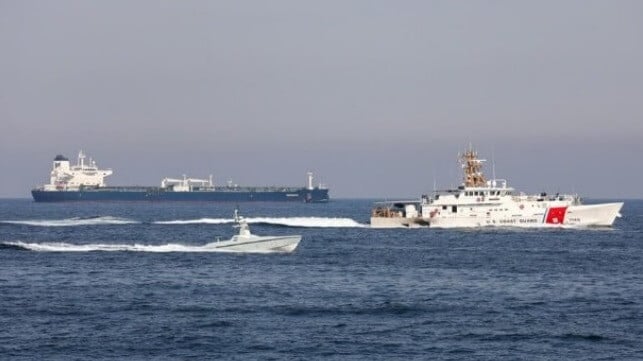Shipping Not Immediately Impacted as World Watches Israel-Iran Conflict

The global shipping industry is holding its breath anxiously watching the emerging conflict between Israel and Iran as is the world. Analysts are scrambling to predict the potential impact on shipping while security services are issuing cautions and some nations are already issuing advice to shipping.
As would be expected, the price of oil jumped dramatically on world markets after the news that Israel had struck and killed leadership within Iran’s military and nuclear program, bombed nuclear sites, and defense installations. At midday, the global price of oil was up around seven percent on a barrel after news that Iran’s first response was limited to about 100 drones launched at Israel. The Israel Defense Force is saying the drones were intercepted and caused no damage.
“The Strait of Hormuz remains open and commercial traffic continues to flow uninterrupted,” reported the Joint Maritime Information Center while also saying “JMIC has no indications of an increased threat to the maritime environment.”
JMIC however immediately raised the “likelihood of regional conflict” to “significant.” It said the effect on the maritime environment is not predictable. It is advising increased security measures and monitoring the situation.
The UK Maritime Trade Operations had issued its first warning of “increased tension” on June 11. The UK today, June 13, according to a report from Reuters, advised merchant ships to avoid sailing through the southern Red Sea and the Gulf of Aden.
Greece’s Ministry of Shipping reports Reuters also issued a warning to commercial shipping. The Ministry is asking Greek ship owners and operators to send details of their planned transits through the Strait of Hormuz. Greece is especially sensitive due to its entanglements with Iran which has seized and held Greek-owned tankers in the past.
One company, the UK’s gas producer Energean has already reported it was temporarily suspending production on its FPSO located off the northern coast of Israel. The company said it had been ordered to suspend activities by Israel’s Ministry of Energy and Infrastructure.
Iran has not indicated its strategy other than announcing that “a bitter and painful fate awaits Israel.” It has however also said it believes the United States supported the efforts although the Trump administration has been quick to disavow any involvement in the attacks. It however announced that its oil infrastructure was functioning normally and not part of the overnight attacks.
Well-known shipping industry analysts Peter Sand, Chief Analyst at Xeneta, and Lars Jensen, CEO of Vespucci Maritime, both speculated on the potential of a “de facto closure” of the Strait of Hormuz similar to what the Houthis achieved with the Red Sea in 2024.
“Any closure of the Strait of Hormuz would see services re-routed, with increased reliance on India West Coast ports for connecting the Far East to Indian sub-continent,” commented Peter Sand on the potential impact to the container shipping segment in particular. “The inevitable disruption and port congestion, as well as the potential for higher oil prices, would cause a spike in ocean freight container shipping rates, with carriers likely also pushing for a ‘security surcharge’ on these trades in the coming days.”
Jensen highlighted three major risks with the first of course being oil prices. In addition to the impact on oil from the closing of the Strait of Hormuz, he highlights the impact on imports and exports from Saudi Arabia, the UAE, Qatar, Bahrain, Kuwait, and Iraq. A disruption at Saudi Arabia’s main ports, Jebel Ali and Khalifa, Jansen points out could spill over to regional congestion in Asia.
Iran, he notes in the past has shown it is “not adverse” to interfering with commercial shipping. It has held the MSC Aries containership for over a year as well as having a history of seizing crude oil tankers. The Houthis released the crew but still hold the vehicle carrier Galaxy Leader which they seized in November 2023.
